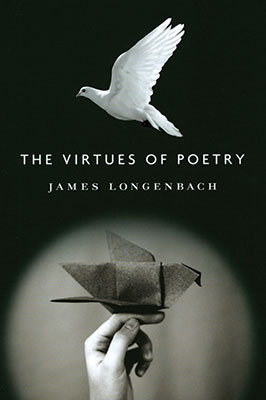The Virtues of Poetry by James Longenbach
Minneapolis, Minn. Graywolf. 2013. ISBN 9781555976378
 Like a man who takes clocks apart for the sheer joy of showing us the marvelous ways in which they work, James Longenbach displays a great talent for insightful close reading, a process through which he reveals the inner workings of a poem in ways that augment rather than diminish our wonder in reading it. This process is too elaborate and delicate to reproduce here, but the result is often both an astute understanding of a particular poem and a useful sketch of a broadly applicable poetic principle, as when his reading of Andrew Marvell’s “The Garden” leads him to conclude that “the language feels inexplicably complex by virtue of its restraint, by virtue of implications the language raises but does not acknowledge having raised.” For the reader intent on growing as a poet, such insights offer accessible yet admirable models for imitation. For the poetry enthusiast intent on growing as a reader, they offer a handle by which to grasp many of the best poems in English.
Like a man who takes clocks apart for the sheer joy of showing us the marvelous ways in which they work, James Longenbach displays a great talent for insightful close reading, a process through which he reveals the inner workings of a poem in ways that augment rather than diminish our wonder in reading it. This process is too elaborate and delicate to reproduce here, but the result is often both an astute understanding of a particular poem and a useful sketch of a broadly applicable poetic principle, as when his reading of Andrew Marvell’s “The Garden” leads him to conclude that “the language feels inexplicably complex by virtue of its restraint, by virtue of implications the language raises but does not acknowledge having raised.” For the reader intent on growing as a poet, such insights offer accessible yet admirable models for imitation. For the poetry enthusiast intent on growing as a reader, they offer a handle by which to grasp many of the best poems in English.
“Restraint” is a virtue that Longenbach returns to throughout the volume, not surprisingly since Longenbach’s own spare and evocative poetry exhibits this virtue so well. In reconsidering the paradigm of “confessional” poetry, for example, he notes that “to varying degrees, both Lowell’s and Bishop’s poems embody a tension between reticence and revelation, a tension crucial to any art that might otherwise seem merely reticent or merely revelatory.” Using poems by Blake, Dickinson, Louise Glück, and many others, Longenbach repeatedly demonstrates the fruitful tension in great poetry between restraint and excess, showing how, “like the mortal beings who make them, poems want to exceed the restraints without which they could never have existed in the first place.” Few critics have so well demonstrated for a general audience the internal dynamics necessary for great poems.
Despite his astute attention to detail—or rather because of it—Longenbach is also capable of conveying a convincing view of the big picture. He can give a sense of an entire career, as in his fine chapter “The Opposite of Risk,” which traces subtle shifts in over half a century of work by John Ashbery. The chapter titled “Poetry Thinking” tackles an even bigger subject in its persuasive account of the ways in which Shakespeare’s monologues have shaped the way we expect consciousness to be portrayed in poetry over the last four hundred years.
One of the chief virtues of James Longenbach’s new book is its inclusiveness. This is a book for both the serious poet and the serious critic, for both the initiate and the fully initiated, for both the adamantly classicist and the thoroughly modern. Longenbach expounds for all who care to listen the virtues common to what he unabashedly considers superior poetry.
Benjamin Myers
Oklahoma Baptist University

